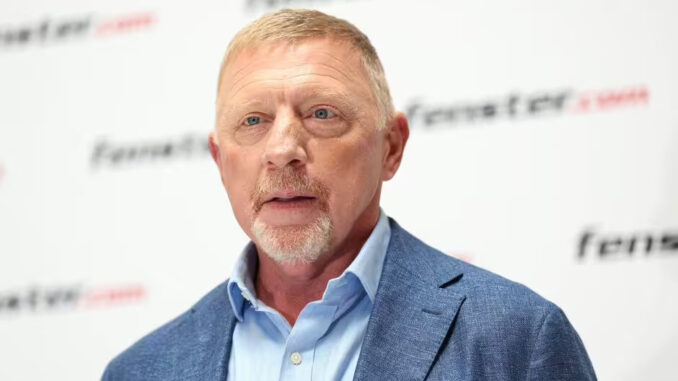
In the high-stakes world of professional tennis, where glory can arrive in a flash and linger like a shadow for decades, few stories capture the bittersweet essence of early triumph quite like that of Boris Becker. The German tennis icon, whose name evokes memories of thunderous serves and audacious dives across the grass of Wimbledon, recently laid bare a confession that resonates deeply with today’s rising stars. At 57, Becker admitted that his crowning achievement—snatching the Wimbledon men’s singles title at the tender age of 17—might have been a curse in disguise, a sentiment he shares with Britain’s own prodigy, Emma Raducanu.
Picture the scene: It’s July 1985, and a lanky teenager from Leimen, Germany, steps onto Centre Court as a wild-card entry, facing the seasoned American Kevin Curren in the final. Becker, with his mop of blond hair and unbridled energy, defies the odds, becoming the youngest men’s champion in Wimbledon’s storied history. The victory catapults him into superstardom overnight, earning him three Wimbledon titles in total and six Grand Slams across his career. Fans hailed him as a wunderkind, a boy wonder who had conquered the sport’s most prestigious summit before he could legally drink in most countries. But in the quiet reflection of hindsight, Becker now views that pinnacle as a pivotal misstep.
“I’m happy to have won three, but maybe 17 was too young,” Becker confided in a candid interview, his voice carrying the weight of decades. “I was still a child.” The pressure that followed was unrelenting, a tidal wave that reshaped his life in ways he couldn’t have anticipated. “Whatever you do, wherever you go, whoever you talk to, it becomes a world sensation,” he recalled. “It becomes the headline of some of the most important papers of tomorrow. And you’re just trying to mature, just trying to find your feet in the world.” That seismic shift, he explained, “changed the road ahead tremendously.” Becker likened himself to other young phenoms in sports—those fleeting meteors who burn bright but often flicker out too soon. “Usually, they don’t make it to 50,” he mused, a poignant observation on the toll of precocious success.
Becker’s words strike a chord with Emma Raducanu, the 22-year-old British sensation whose own fairy-tale ascent mirrors his in haunting detail. Just four years ago, in 2021, Raducanu stunned the tennis world by storming to the US Open title as a qualifier, unseeded and just 18 years old—the first British woman to claim a Grand Slam in 44 years. Her run was pure magic: zero sets dropped, a blend of poise and power that captivated Arthur Ashe Stadium. Yet, in the aftermath, the glamour gave way to a grueling gauntlet of injuries, form slumps, and mental fatigue. Raducanu, who has spoken openly about the isolation of her journey, captured the duality of that moment with raw honesty. “That moment on the court, when I was celebrating, I was like, I would literally trade any struggle in the world for this moment,” she reflected. “Anything can come my way, I will take it for what I have right now because this is the best thing in the world. I promised myself that, on the court that day. Since then I’ve had a lot of setbacks, one after the other.”
In quieter moments, doubt creeps in for her too. “And sometimes I think to myself I wish I’d never won the US Open, I wish that didn’t happen,” Raducanu admitted. “Then I am like, remember that feeling, remember that promise, because it was completely pure.” Her words echo Becker’s lament, underscoring a universal truth for child prodigies: the summit is exhilarating, but the descent tests the soul. Raducanu’s career has been a rollercoaster since—wrist surgeries, ankle woes, and the relentless scrutiny of a nation hungry for its next champion. Yet, like Becker before her, she persists, channeling that initial spark into resilience. At this year’s US Open, she reached the fourth round, a testament to her grit amid the chaos.
Becker’s path diverged even further from the court into life’s unforgiving arena. The man who once pocketed millions in prize money and endorsements found himself ensnared by extravagance and poor choices. “I was too comfortable. I had too much money. Nobody told me ‘no’—everything was possible,” he acknowledged. “In hindsight, that’s the recipe for disaster.” His off-court saga culminated in a stark fall: in 2022, he was sentenced to two and a half years in a UK prison for concealing assets to dodge bankruptcy repayments, a scandal that shocked the sports world. He served eight months before deportation, despite having called England home for a decade. Emerging from that ordeal, Becker has reinvented himself as a commentator and coach, his voice now a steady presence on the BBC and beyond.
Through it all, he measures every new chapter against that 17-year-old triumph. “When you start a second career, everything is measured at this success of winning Wimbledon at 17,” he said, a line that captures the double-edged sword of legacy. But Becker’s admission isn’t mired in defeat; it’s laced with hard-won wisdom. “So you take accountability for your actions, which is very important because you cannot look back any more. You cannot change the past. You can only change the future because you live in today.”
As the tennis calendar churns toward another Wimbledon fortnight, Becker’s story—and Raducanu’s ongoing quest—serves as a cautionary symphony for the next generation. In a sport that devours its young, their shared regret illuminates the human cost of immortality on the scoreboard. Yet, it also whispers of redemption: the boy who dove for glory has risen again, and the girl who promised herself purity amid pandemonium may yet redefine her legend. In the end, perhaps the true victory lies not in the win, but in the enduring fight to claim one’s feet in a world forever altered by it.
Leave a Reply